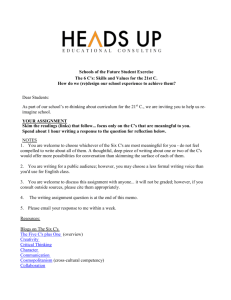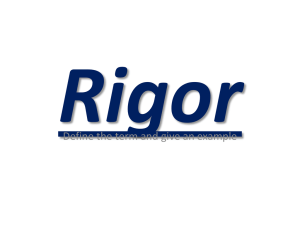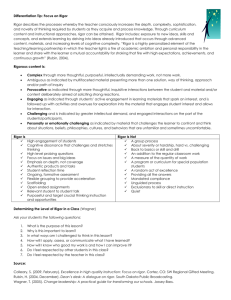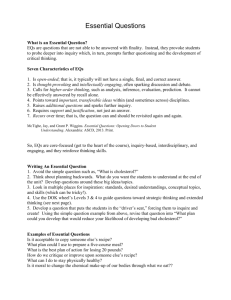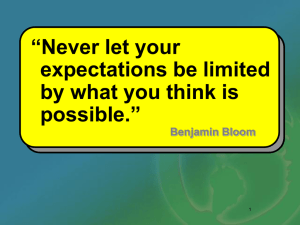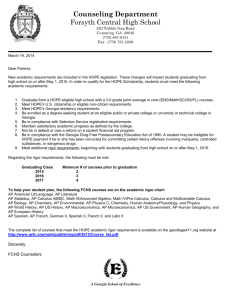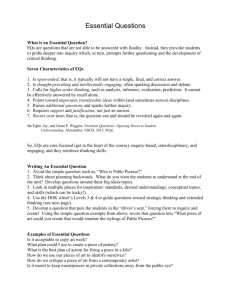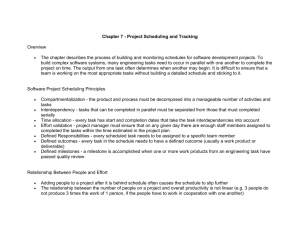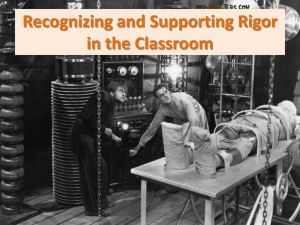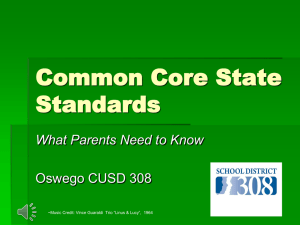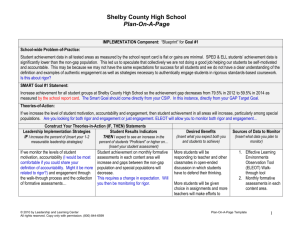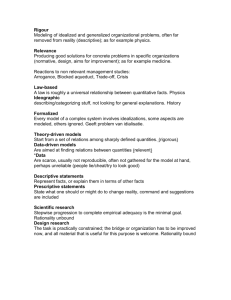Title Page - Roanoke County Public Schools
advertisement
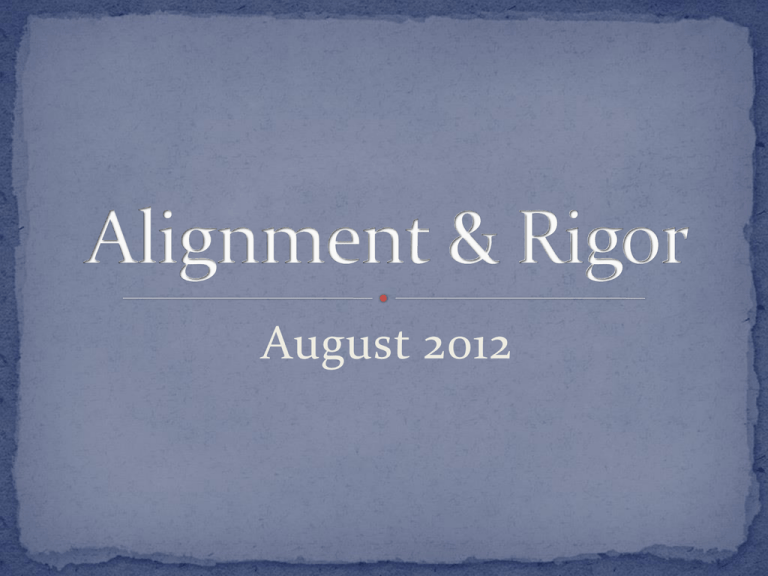
August 2012 VCU Study of the Virginia Standards of Learning In some cases, the tests didn’t rise to the Bloom’s levels of the standards. This meant our tests didn’t adequately assess the standards. Common Core Movement Out-rigoring the Common Core Virginia will have access to the Common Core item bank Performance-based assessments 21st Century Skills Movement How can we assess with only multiple-choice in a performance-based world? 4 C’s: Critical Thinking, Creativity, Collaboration, & Communication Move to a Growth Model (required to earn an AYP waiver) Too many pass-advanced scores are a problem in a growth model Economic Changes + PISA and Other International Comparisons Performance-based Tasks (TEIs) STEM initiatives (Science, Technology, Engineering, & Math) Increased rigor in the classroom End of NCLB: A 100% passing mandate was stifling rigor and the 4 C’s Push for Algebra I by the 8th grade So…A child has two years between his elementary content and high-school credit-bearing content More difficult to earn pass-advanced Standards-setting: Move from “should a borderline student be able to get this correct” to “is this possible or impossible for students.” Virginia’s NCLB waiver has set new Annual Measurable Objectives in elementary reading and math that are realistic and achievable. Roanoke County was ahead of the 6-year targets in all performance-based subgroups. The new, more rigorous mathematics tests are NOT impossible to master. In fact, even our most high-need elementary schools proved it. If we respond positively, these changes can actually make education more fun and rewarding for both teachers and students. Bower & Powers (2009): “…how the standard curriculum is delivered in the classroom to ensure that students are not only successful on standardized assessments but also able to apply this knowledge to new situations both within the classroom and in the real world.” 1. Critical thinking and problem solving 2. Collaboration and leadership 3. Agility and adaptability 4. Initiative and entrepreneurialism 5. Effective oral and written communication 6. Accessing and analyzing information 7. Curiosity and imagination Where do Wagner’s 7 Survival Skills Fit into Bloom’s (Revised) Taxonomy? Source: Overbaugh/Shultz - ODU Bloom’s Action Verbs http://www.southalabama.edu/oll/mobile/Jobaids/performance_objectives.html “Relevance Makes Rigor Possible” – Bill Daggett/International Center for Leadership in Education Scott County example – “No one ever told us it was hard.” Rigorous activities show higher gains in student achievement with low-performing students than non-rigorous activities. Students who use project-based learning outperform their traditionally-educated peers on standardized tests (Bell, 2010) Mason’s Cove – 94% Glen Cove – 85% Green Valley – 85% Title I Schools – 74.7% Non-Title I Schools – 71.7% Rigor means different work, not more work You are NOT being asked to be at the highest level of Bloom’s Taxonomy all the time. Sometimes simple direct instruction is an important lesson component. Adding rigor doesn’t mean we let students “sink or swim.” This is NOT going back to the way things used to be. Student is introduced to the content -> Student applies the content in a real-world scenario or performs a high-interest task that forces him/her to apply the new knowledge -> When students struggle, teachers lead the student to the correct answer through a questioning process rather than simply give the student the answer -> Students produce a product demonstrating their understanding of the concept. Effective Questioning Techniques Source: Julie Edmunds/SERVE “Students are pulled through the curriculum by a meaningful question to explore, and engaging real-world problem to solve, or a design challenge to meet.” (Buck Institute for Education) Is challenging and interesting Requires in-depth inquiry and higher-order thinking to answer it To answer it, the question makes your students learn core SOL content and /or skills Examples: What would be an appropriate poem to sum up the London Olympics? Which of the famous Americans had the greatest impact in shaping the principles of modern America? Instruction Is the content part of the SOLs? Does the lesson require students to engage in higher- order thinking? Do students have the ability to apply their knowledge into a real-world scenario? Are students asked to explain or justify their conclusions? Assessment Does the cognitive level of the questions match the cognitive level of the verbs in the standards? Is the assessment all multiple choice (it shouldn’t be) Are technology-enhanced question formats used? Never give a test taken directly from textbook resources. Blended tests (some multiple choice, some enhanced items, some free response, multiple cognitive levels assessed) should be the new normal. Test items should move from lower- to higher-order in order to differentiate whether the student knows the content and can apply the content. Test items should combine essential skills and essential content into single questions when possible. Correct use of IA, VSUP, TFHS, and other item banks. Table of Specifications Adapted from Leslie Grant/William & Mary Technology- Enhanced Items Don’t Require Technology: Drag and Drop Spiraling “Old Friends” - Cumulative /most missed testing Repetition Lessons that are novel/different D0 your kids sleep? Take information in one format and re-represent it in another format Link to prior and future learning Edgar Dale / Cone of Experience Have you taken advantage of the 10-point scale to add rigor into your assessments? Is a student’s grade mostly content mastery or work completion? If using a points system, what is an appropriate weight for a homework or in-class assignment versus a test? Can students get credit for learning a concept after the initial test? Am I effectively communicating student progress with parents? Social Studies is the only subject that will get released items this year. Some of the strategies that we used to teach our students are no longer applicable. If an average student thinks the SOL was difficult, that is a clue that your class either lacks rigor or your alignment is off. This PPT is posted on my website at: http://www.rcs.k12.va.us/SOL/ Ben Williams Assoc. Dir. of Testing, Remediation, and Staff Development 562-3900 x 10257 bewilliams@rcs.k12.va.us
